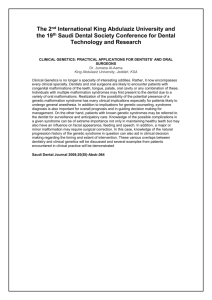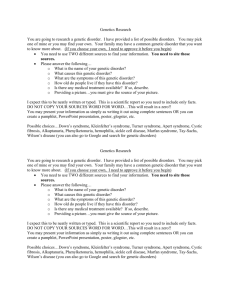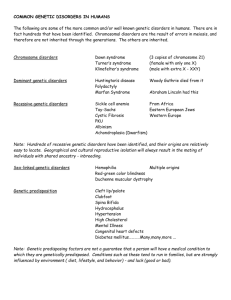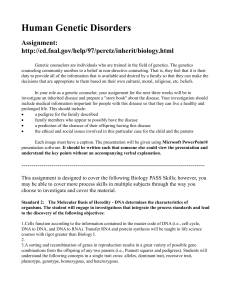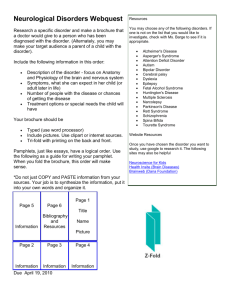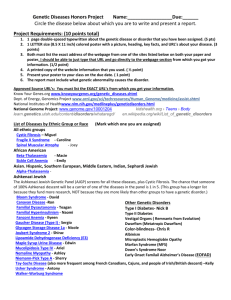Genetic Disorders Project and Presentation
advertisement
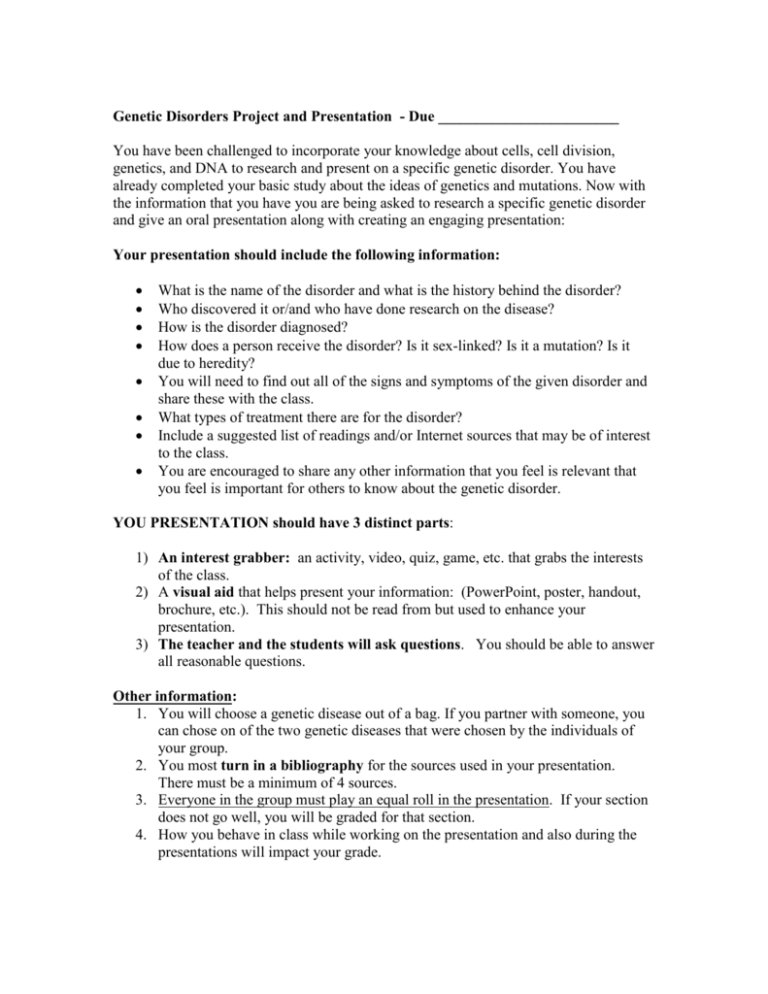
Genetic Disorders Project and Presentation - Due ________________________ You have been challenged to incorporate your knowledge about cells, cell division, genetics, and DNA to research and present on a specific genetic disorder. You have already completed your basic study about the ideas of genetics and mutations. Now with the information that you have you are being asked to research a specific genetic disorder and give an oral presentation along with creating an engaging presentation: Your presentation should include the following information: What is the name of the disorder and what is the history behind the disorder? Who discovered it or/and who have done research on the disease? How is the disorder diagnosed? How does a person receive the disorder? Is it sex-linked? Is it a mutation? Is it due to heredity? You will need to find out all of the signs and symptoms of the given disorder and share these with the class. What types of treatment there are for the disorder? Include a suggested list of readings and/or Internet sources that may be of interest to the class. You are encouraged to share any other information that you feel is relevant that you feel is important for others to know about the genetic disorder. YOU PRESENTATION should have 3 distinct parts: 1) An interest grabber: an activity, video, quiz, game, etc. that grabs the interests of the class. 2) A visual aid that helps present your information: (PowerPoint, poster, handout, brochure, etc.). This should not be read from but used to enhance your presentation. 3) The teacher and the students will ask questions. You should be able to answer all reasonable questions. Other information: 1. You will choose a genetic disease out of a bag. If you partner with someone, you can chose on of the two genetic diseases that were chosen by the individuals of your group. 2. You most turn in a bibliography for the sources used in your presentation. There must be a minimum of 4 sources. 3. Everyone in the group must play an equal roll in the presentation. If your section does not go well, you will be graded for that section. 4. How you behave in class while working on the presentation and also during the presentations will impact your grade. 5. There will be a quiz on the genetic diseases following the presentations so TAKE NOTES!! The quiz will be worth a 10-point lab grade and you can use your notes on the quiz. 6. The presentation will be counted as a 100-point test. List of Internet resources that may be helpful to you in creating your presentation: Yahoo - Genetic Disorders http://dir.yahoo.com/Health/Diseases_and_Conditions/Genetic_Disorders/. Site explains several different disorders and contains links to all of the different types of genetic disorders. Genetic Disorder Library http://learn.genetics.utah.edu/units/disorders/whataregd To learn more about different genetic disorders, browse through the Genetic Disorder Library. A Genetics Glossary http://biology.about.com/science/biology/gi/dynamic/offsite.htm?site=http://helios.bto.ed .ac.uk/bto/glossary/index.html A basic genetic glossary. Genetics Education Center http://www.kumc.edu/gec/. Seeks to help educate people about genetics. Understanding Gene Testinghttp://www.accessexcellence.org/ae/AE/AEPC/NIH/index.html. This site talks of how genes are linked to disease and how a gene creates a genetic disorder. List of possible Genetic Disorders to Present: 1. 4. Achondroplasia ALZHEIMER'S DISEASE 7. Childhood Apraxia of Speech 10. Duchenne Muscular Dystrophy 13. Harlequin type ichthyosis 16. Klinefelters Syndrome 19. Marfan Syndrome 22. PHENYLKETONURIA 25. Proteus Syndrome 28. Severe Combined Immunodeficiency 31. Tourette Syndrome 34. Usher Syndrome 2. 5. Adrenal Hyperplasia Angelman Syndrome 3. 6. 8. Cri du chat Syndrome 9. Albinism BREAST CANCER AND OVARIAN CANCER Cystic Fibrosis 11. Familial Dysautonomia 12. GALACTOSEMIA 14. Huntington’s Disease 17. Lou Gehrig’s Disease (ALS) 20. PACHYONYCHIA CONGENITA 23. Prader-Willi syndrome 26. Prune Belly Syndrome 29. Sickle Cell 15. Jacobsen Syndrome 18. Maple Syrup Urine Disorder 21. Patau Syndrome 32. Trisomy 18 (Edwards Syndrome) 35. WILLIAMS SYNDROME 33. Turner Syndrome 24. Progeria 27. Retinoblastoma 30. Tay-Sachs Disease Genetic Disease Project: Name of Disease: Members of your group: _____________________________ _____________________________ Ideas about your presentation?? Genetic Disease Project: Name of Disease: Members of your group: _____________________________ _____________________________ Ideas about your presentation?? Genetic Disease Project: Name of Disease: Members of your group: _____________________________ _____________________________ Ideas about your presentation?? Genetic Disease Project: Name of Disease: Members of your group: _____________________________ _____________________________ Ideas about your presentation??
